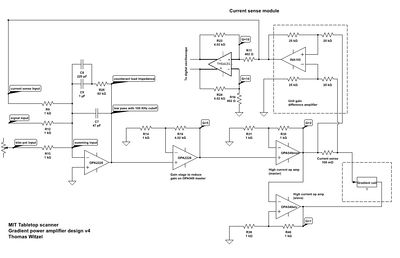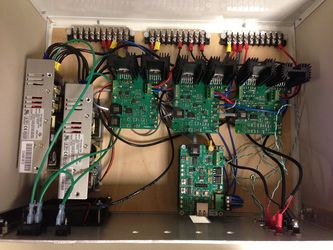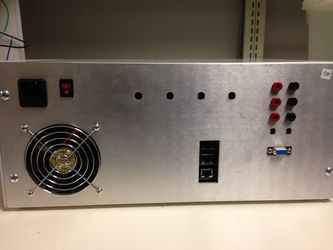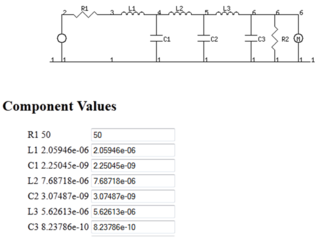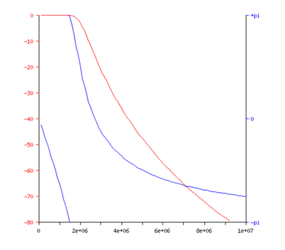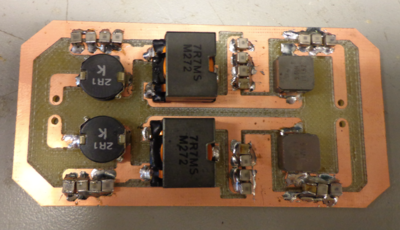Difference between revisions of "Hardware:GPA"
| Line 1: | Line 1: | ||
'''Gradient Power Amplifier''' | '''Gradient Power Amplifier''' | ||
---- | ---- | ||
| − | [[File:GPASchematic.jpg| | + | [[File:GPASchematic.jpg|400px|thumb|right|Figure 1. Gradient Power Amplifier schematic v4]] |
The gradient amplifier is used to supply the current to the gradient coils. Since it's the fields we care about, and the fields are proportional to current, this amplifier can be viewed as a voltage to current transducer; it takes a voltage waveform from the console and creates a current proportional to that voltage in the gradient coil. It is similar to a common audio power amplifier except that it must also be able to output DC currents. It uses two [http://www.ti.com/lit/ds/symlink/opa549.pdf OPA 549] power op-amps in a bridged configuration. A current sensor compares the output current to the input voltage to ensure that the current itself is proportional to the desired signal. The current sensor consists of an [http://www.ti.com/lit/ds/symlink/ina105.pdf INA105] differential amplifier that measures the voltage across a small (0.1 ohm) resistor in series with the output. | The gradient amplifier is used to supply the current to the gradient coils. Since it's the fields we care about, and the fields are proportional to current, this amplifier can be viewed as a voltage to current transducer; it takes a voltage waveform from the console and creates a current proportional to that voltage in the gradient coil. It is similar to a common audio power amplifier except that it must also be able to output DC currents. It uses two [http://www.ti.com/lit/ds/symlink/opa549.pdf OPA 549] power op-amps in a bridged configuration. A current sensor compares the output current to the input voltage to ensure that the current itself is proportional to the desired signal. The current sensor consists of an [http://www.ti.com/lit/ds/symlink/ina105.pdf INA105] differential amplifier that measures the voltage across a small (0.1 ohm) resistor in series with the output. | ||
| − | + | Figure 1 shows [https://gate.nmr.mgh.harvard.edu/wiki/Tabletop_MRI/images/3/32/MIT-GPA-v4.sch.pdf schematic for the GPA boards] generated in Eagle (version 6). Note that a separate A/D converter was used in the initial realization of the boards (DAC on the GPAs was not populated). | |
[https://gate.nmr.mgh.harvard.edu/wiki/Tabletop_MRI/images/b/b9/MIT-GPA-v3-fixed.zip Click here] to download Eagle version 6 board (.brd) and schematic (.sch) files for the V3 GPA board (does not include on-board DAC). | [https://gate.nmr.mgh.harvard.edu/wiki/Tabletop_MRI/images/b/b9/MIT-GPA-v3-fixed.zip Click here] to download Eagle version 6 board (.brd) and schematic (.sch) files for the V3 GPA board (does not include on-board DAC). | ||
| − | + | <gallery caption="Gradient Power Amplifier enclosure" widths="350px" heights="250px" perrow="2"> | |
| + | image:Photo.JPG|GPA boards mounted in enclosure with power supplies, terminal blocks, and digital-to-analog converter boards | ||
| + | image:Front panel photo.JPG|Aluminum front panels were made using a water-jet cutter. [http://www.mouser.com/ProductDetail/Bud-Industries/NHC-14157/?qs=W%252bB5Pl59bv4hUDQy1Kr8cw== Hammond NHC-14157 enclosures] were used to house the GPAs and DACs. | ||
| + | </gallery> | ||
| − | [[File:Front panel photo.JPG|600px|thumb|left|Aluminum front panels were made using a water-jet cutter. [http://www.mouser.com/ProductDetail/Bud-Industries/NHC-14157/?qs=W%252bB5Pl59bv4hUDQy1Kr8cw== Hammond NHC-14157 enclosures] were used to house the GPAs and DACs.]] | + | <!--[[File:Photo.JPG|600px|thumb|left|GPA boards mounted in enclosure with power supplies, terminal blocks, and digital-to-analog converter boards.]]--> |
| + | |||
| + | <!--[[File:Front panel photo.JPG|600px|thumb|left|Aluminum front panels were made using a water-jet cutter. [http://www.mouser.com/ProductDetail/Bud-Industries/NHC-14157/?qs=W%252bB5Pl59bv4hUDQy1Kr8cw== Hammond NHC-14157 enclosures] were used to house the GPAs and DACs.]]--> | ||
| Line 16: | Line 21: | ||
6th order butterworth low pass filters were added to the lines leading to the gradients. | 6th order butterworth low pass filters were added to the lines leading to the gradients. | ||
| − | |||
| − | + | <gallery widths="350px" heights="250px"> | |
| + | image:Filter design.PNG|Filter design and component values for gradient filter. Note that R1 and R2 are not necessary in the final assembly. | ||
| + | image:Filter performance.PNG|Simulated roll off performance of the filter as designed | ||
| + | </gallery> | ||
| − | |||
The final version of these files can be downloaded as [[File:Eagle5.11_filter_board_files.zip Eagle 5.11.0]] and [[File:Filter_boards_v3.zip Gerber]] (for having the boards manufactured). | The final version of these files can be downloaded as [[File:Eagle5.11_filter_board_files.zip Eagle 5.11.0]] and [[File:Filter_boards_v3.zip Gerber]] (for having the boards manufactured). | ||
| Line 27: | Line 33: | ||
'''Note:''' All capacitor pads are for a 1206 package. There are four pads at each spot to allow for using multiple capacitors to obtain the specified value. | '''Note:''' All capacitor pads are for a 1206 package. There are four pads at each spot to allow for using multiple capacitors to obtain the specified value. | ||
| + | |||
| + | [[File:gradient_filter_photo.png|400px|thumb|none|GPA boards mounted in enclosure with power supplies, terminal blocks, and digital-to-analog converter boards.]] | ||
Revision as of 15:15, 9 September 2013
Gradient Power Amplifier
The gradient amplifier is used to supply the current to the gradient coils. Since it's the fields we care about, and the fields are proportional to current, this amplifier can be viewed as a voltage to current transducer; it takes a voltage waveform from the console and creates a current proportional to that voltage in the gradient coil. It is similar to a common audio power amplifier except that it must also be able to output DC currents. It uses two OPA 549 power op-amps in a bridged configuration. A current sensor compares the output current to the input voltage to ensure that the current itself is proportional to the desired signal. The current sensor consists of an INA105 differential amplifier that measures the voltage across a small (0.1 ohm) resistor in series with the output.
Figure 1 shows schematic for the GPA boards generated in Eagle (version 6). Note that a separate A/D converter was used in the initial realization of the boards (DAC on the GPAs was not populated).
Click here to download Eagle version 6 board (.brd) and schematic (.sch) files for the V3 GPA board (does not include on-board DAC).
- Gradient Power Amplifier enclosure
Aluminum front panels were made using a water-jet cutter. Hammond NHC-14157 enclosures were used to house the GPAs and DACs.
Gradient Filter
6th order butterworth low pass filters were added to the lines leading to the gradients.
The final version of these files can be downloaded as File:Eagle5.11 filter board files.zip Eagle 5.11.0 and File:Filter boards v3.zip Gerber (for having the boards manufactured).
Note: Inductors were selected based on lead time and inductance and NOT on the package. Any inductor with similar inductance would work. The board was specifically designed for the following: 2.1 uH, 7.7 uH and 5.6 uH.
Note: All capacitor pads are for a 1206 package. There are four pads at each spot to allow for using multiple capacitors to obtain the specified value.
